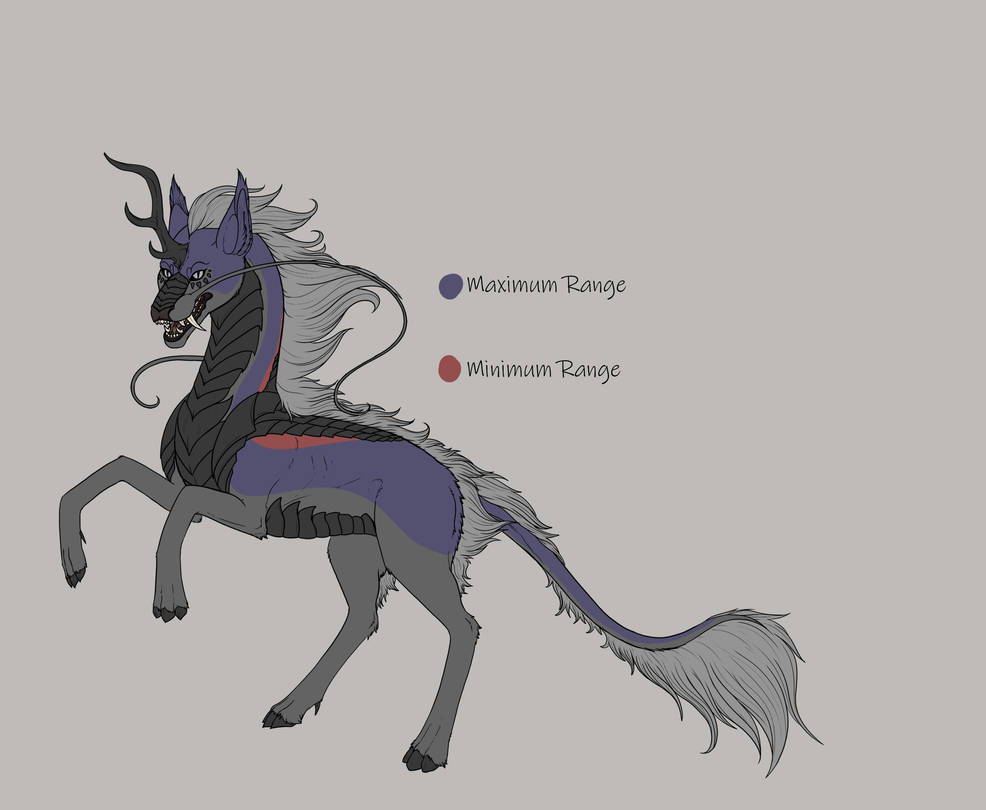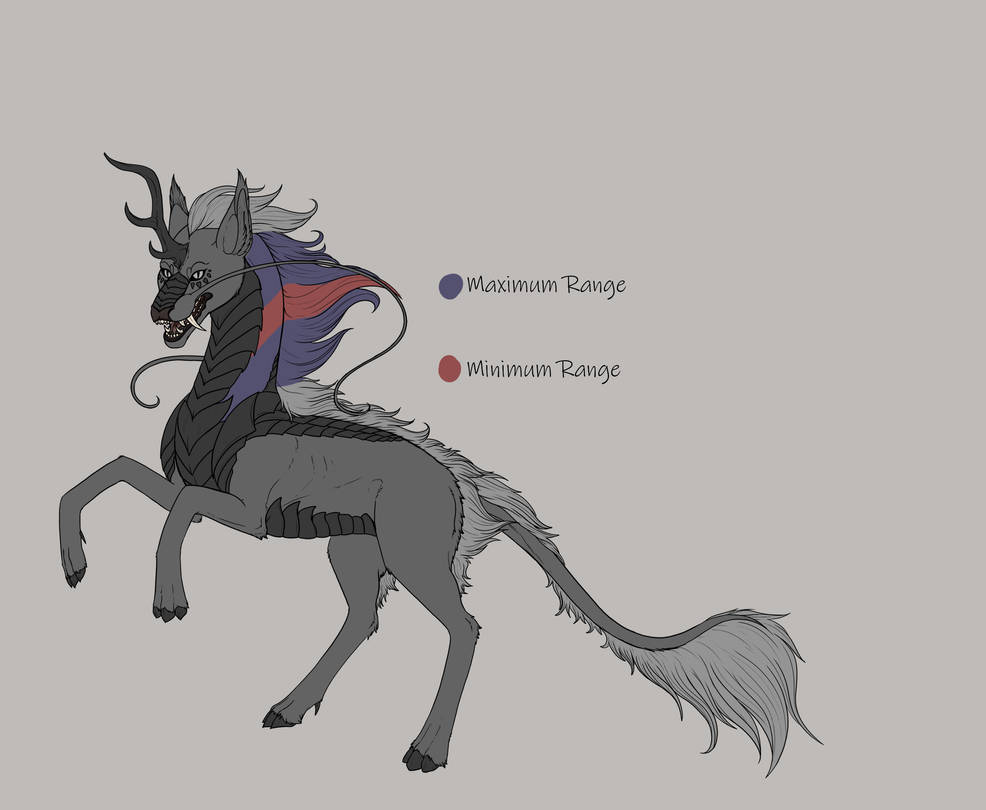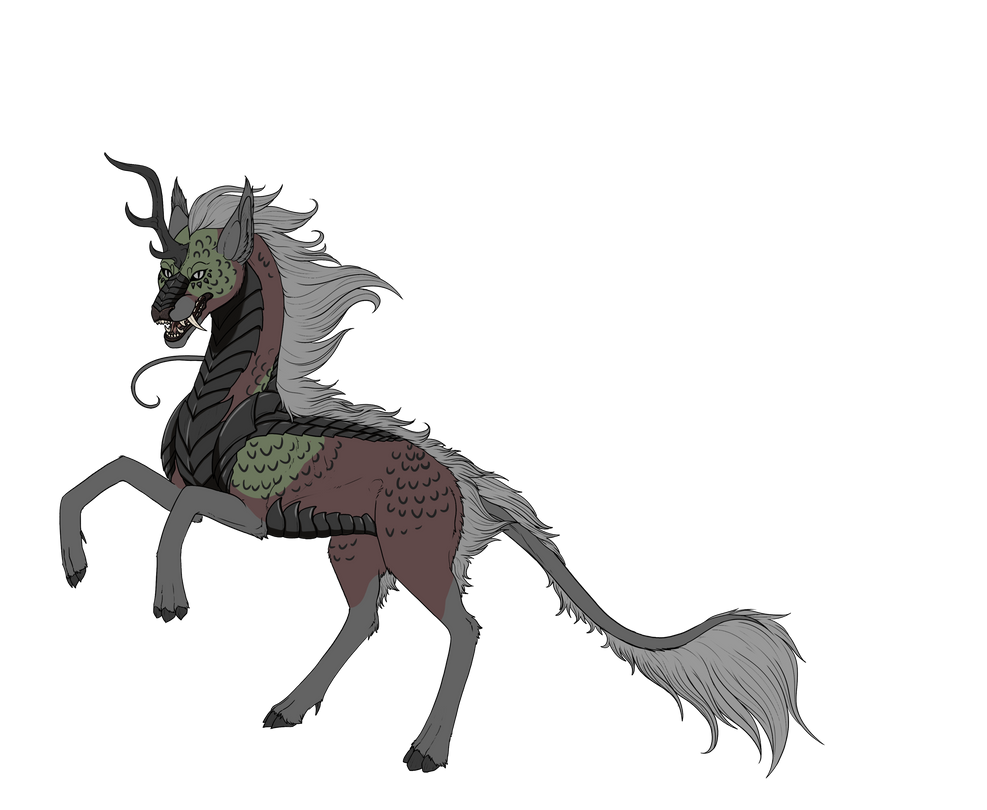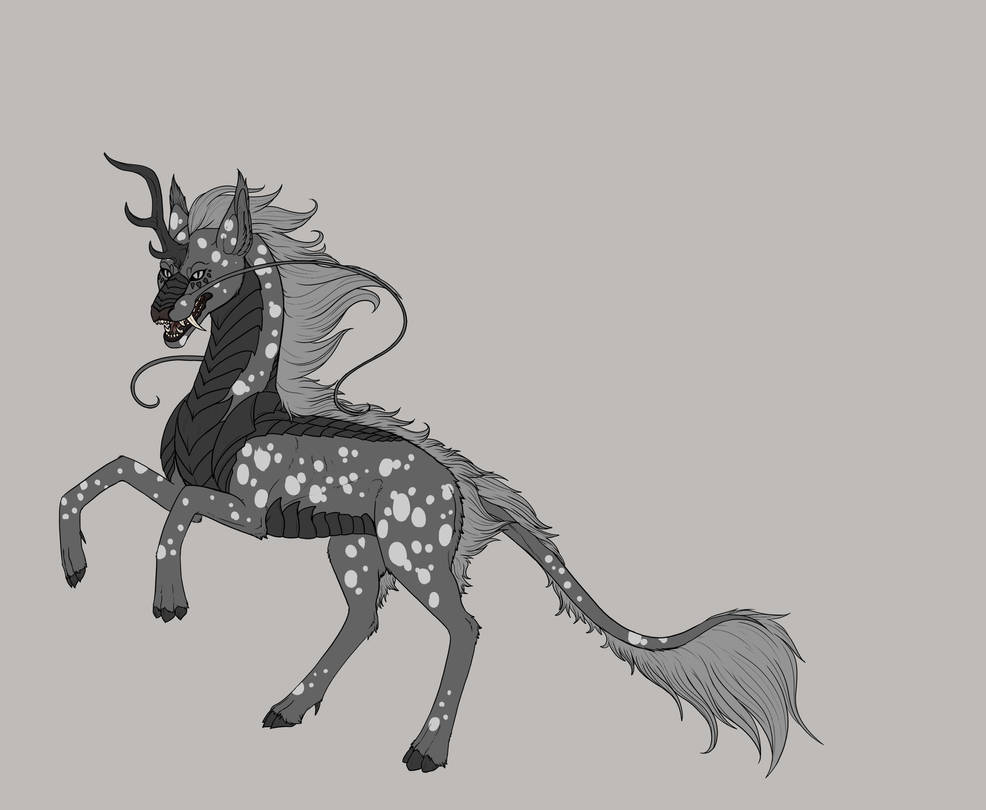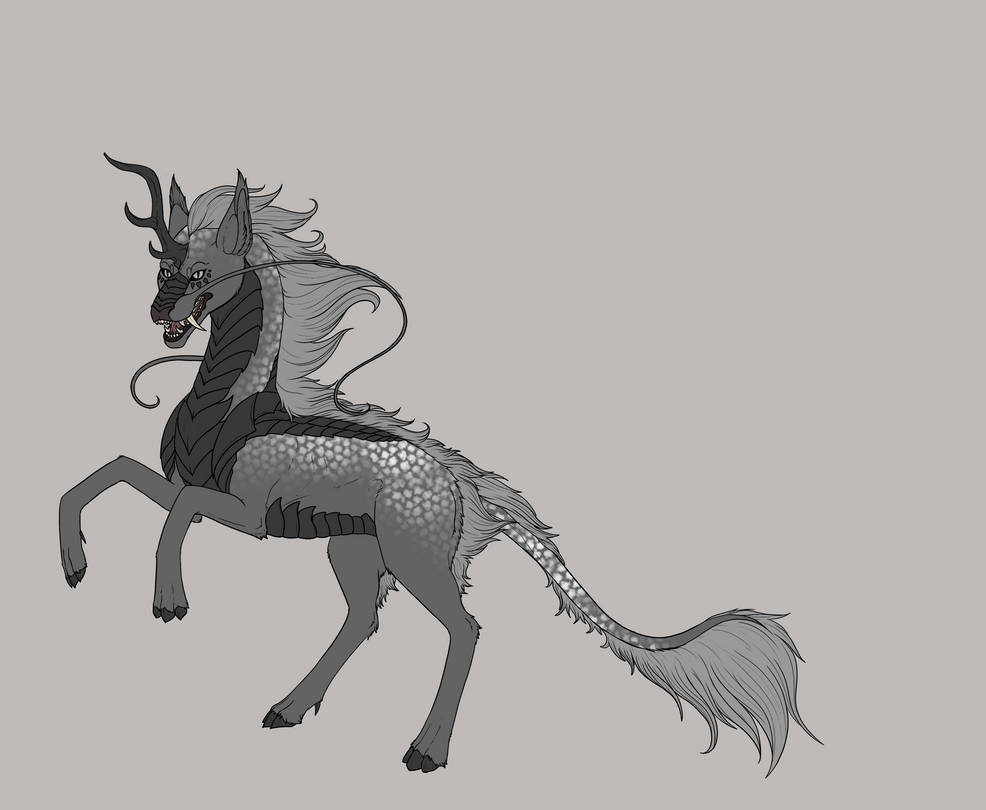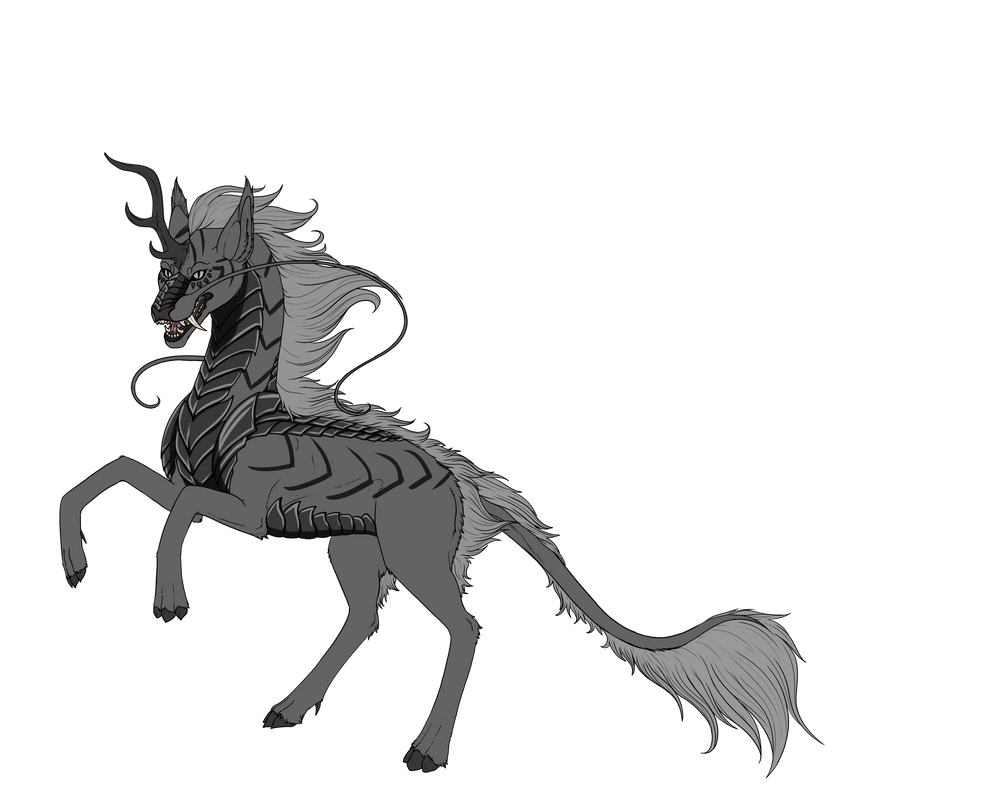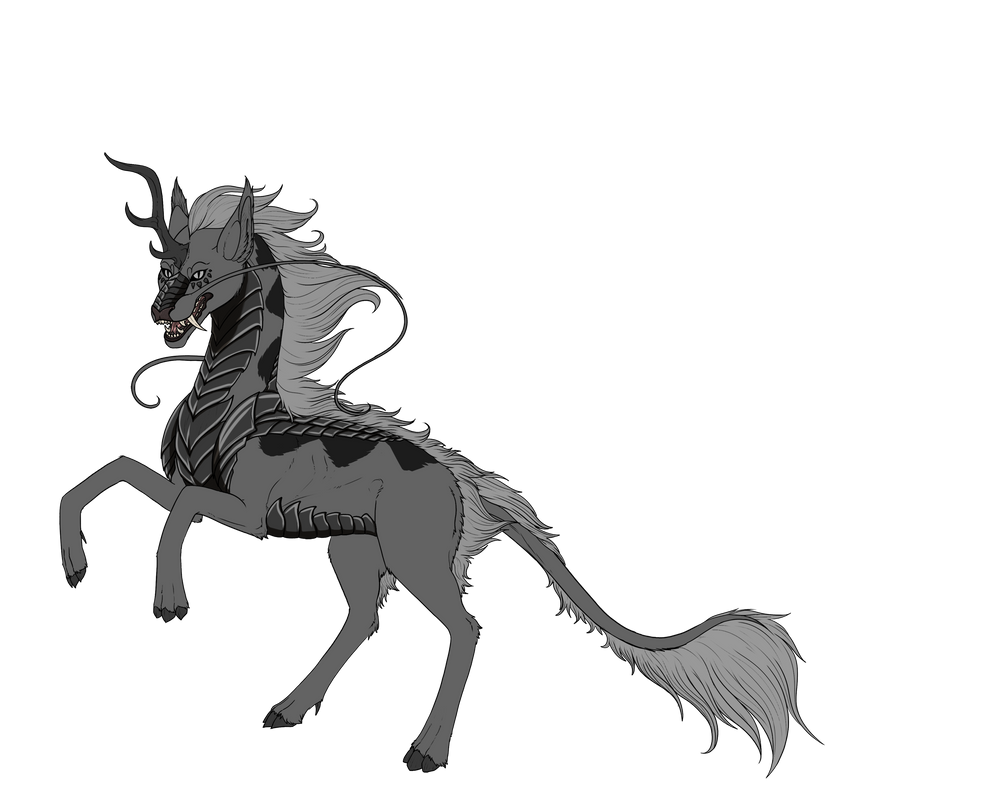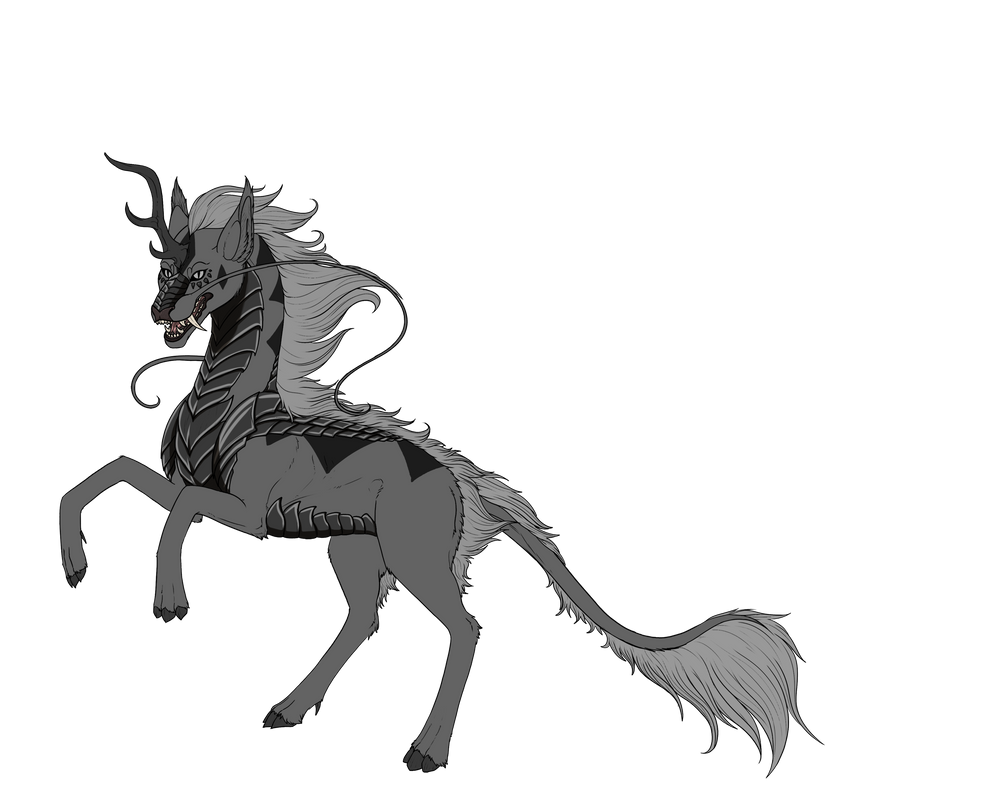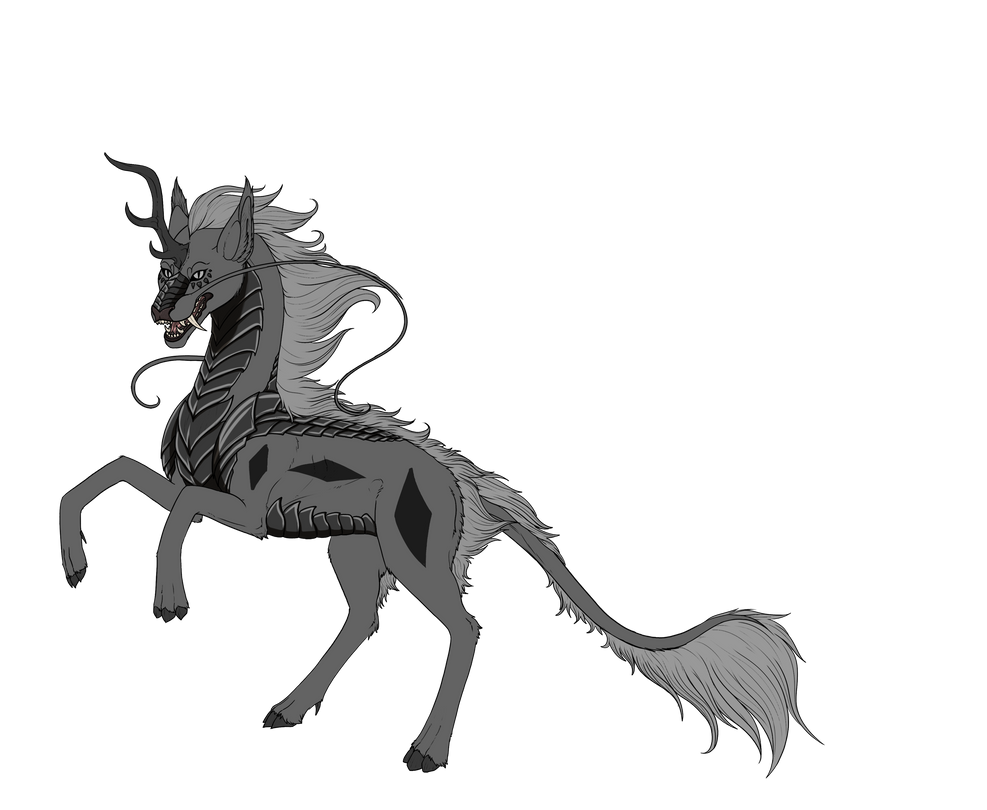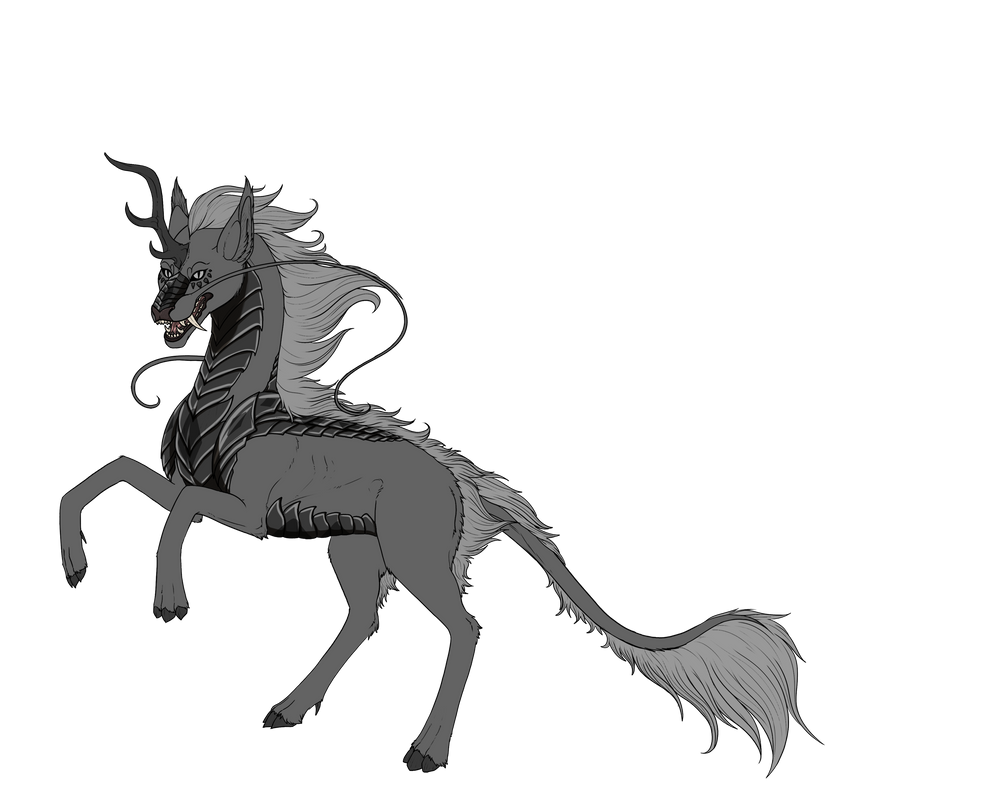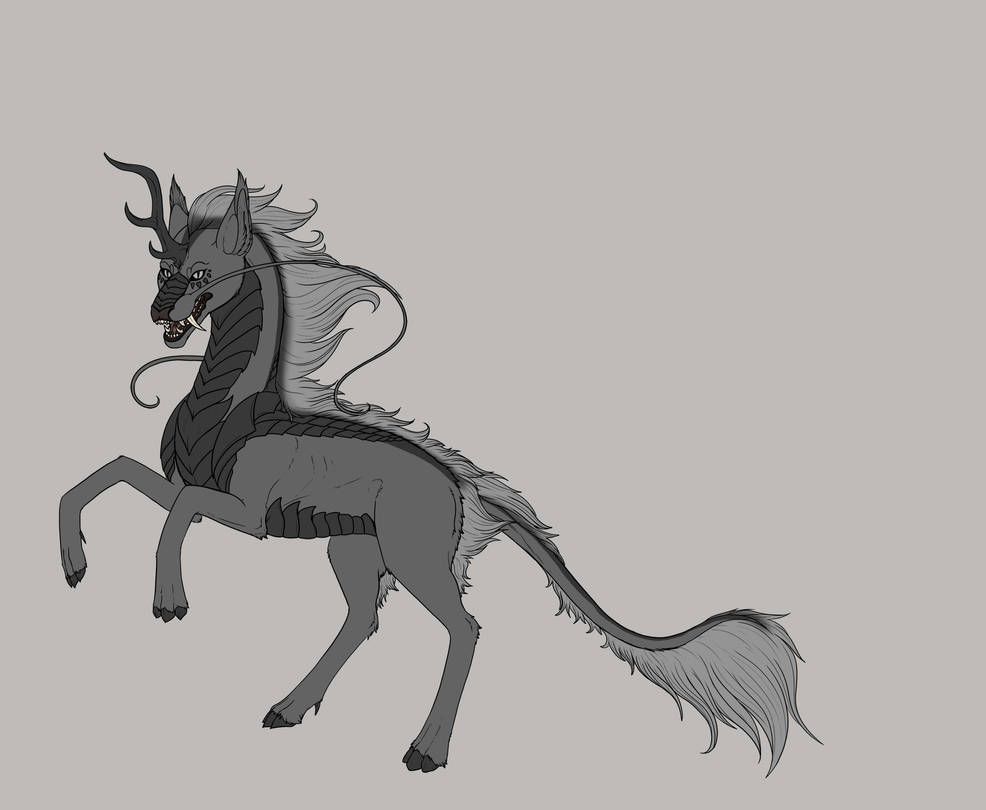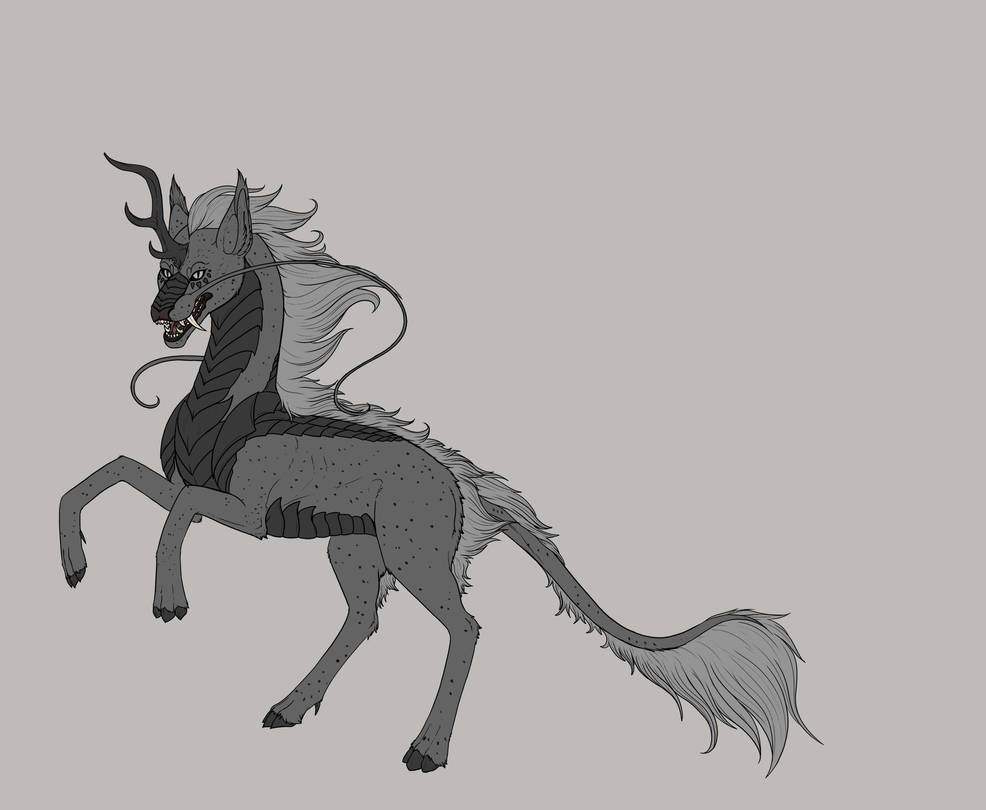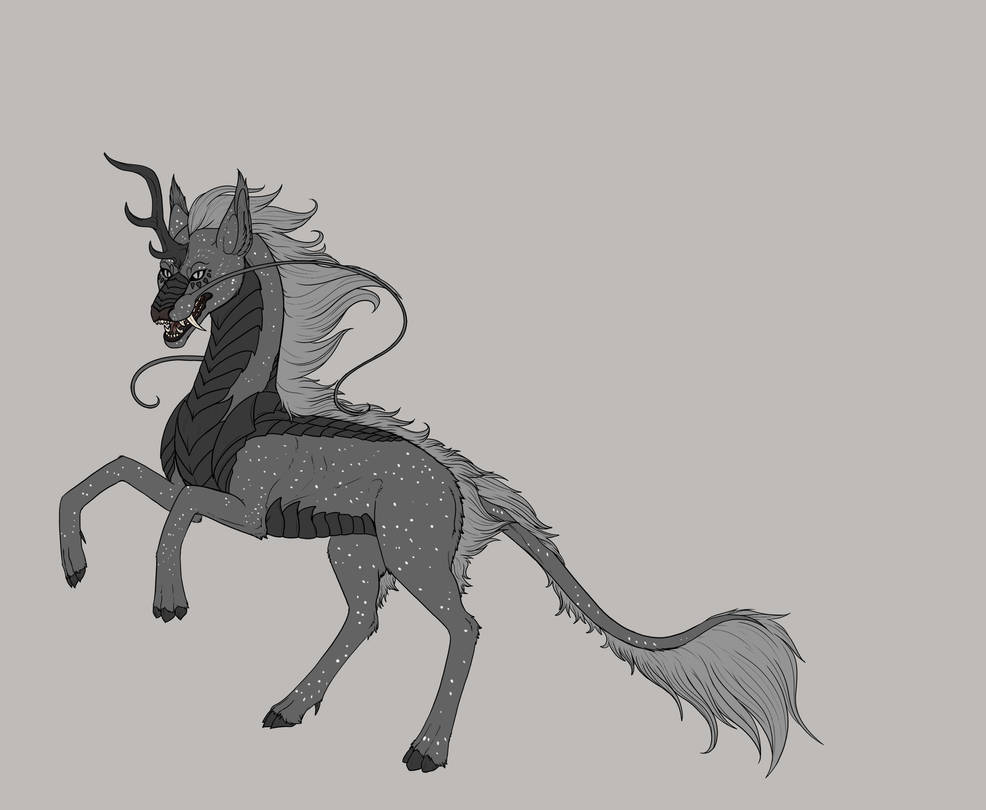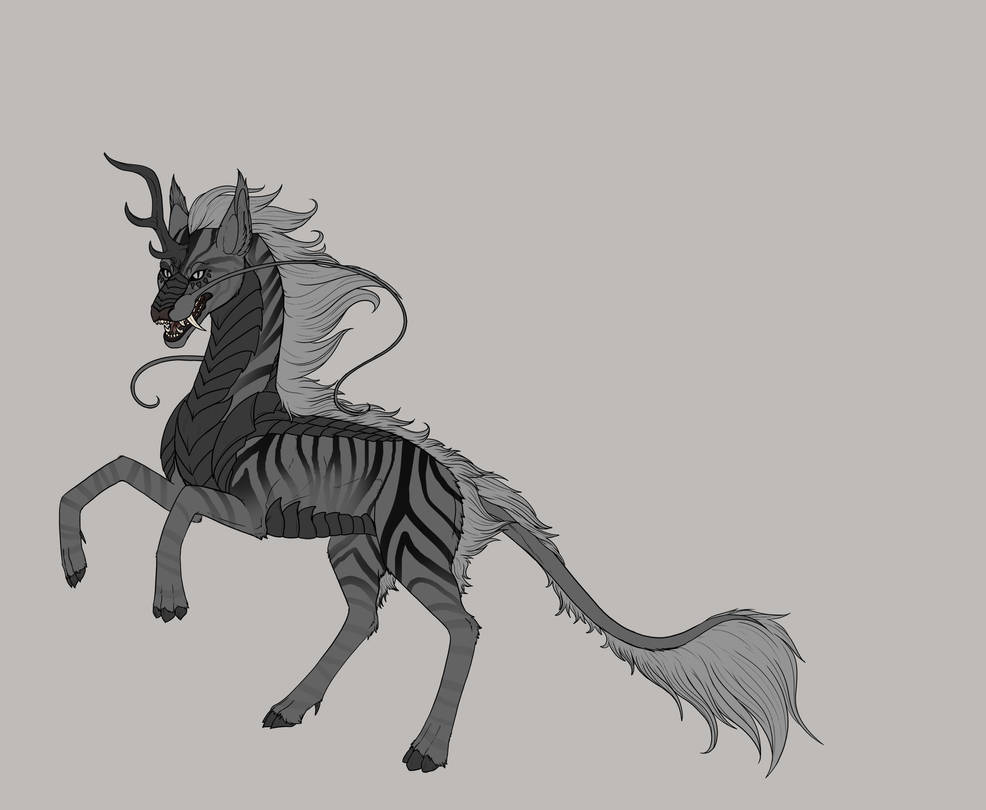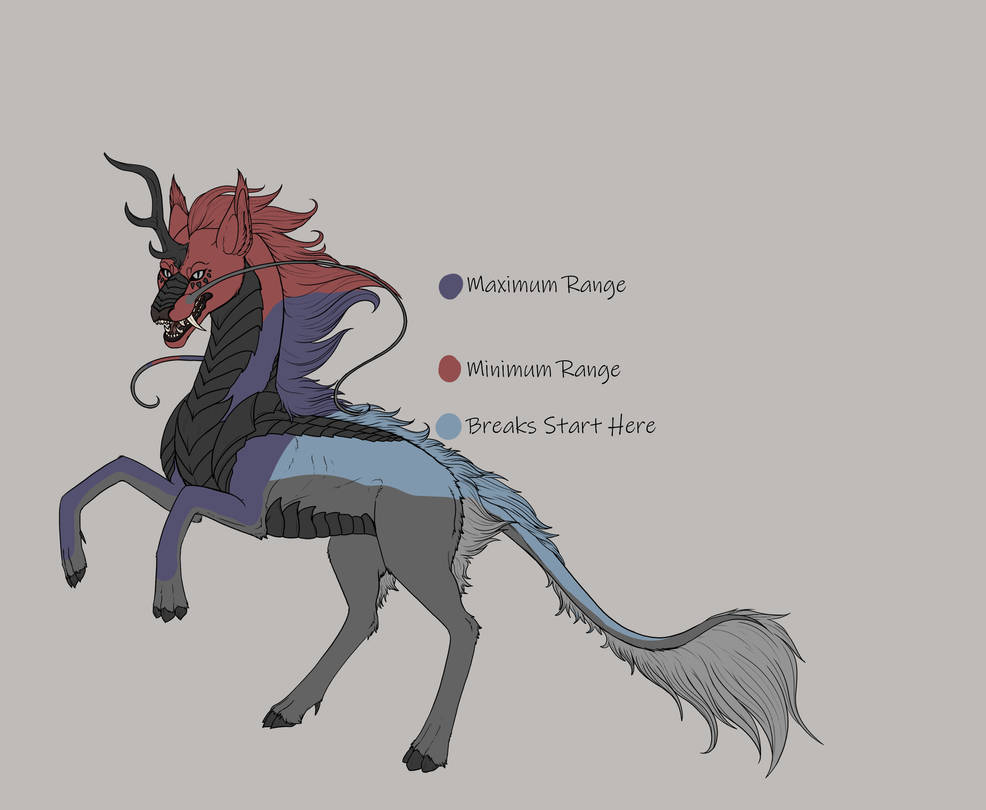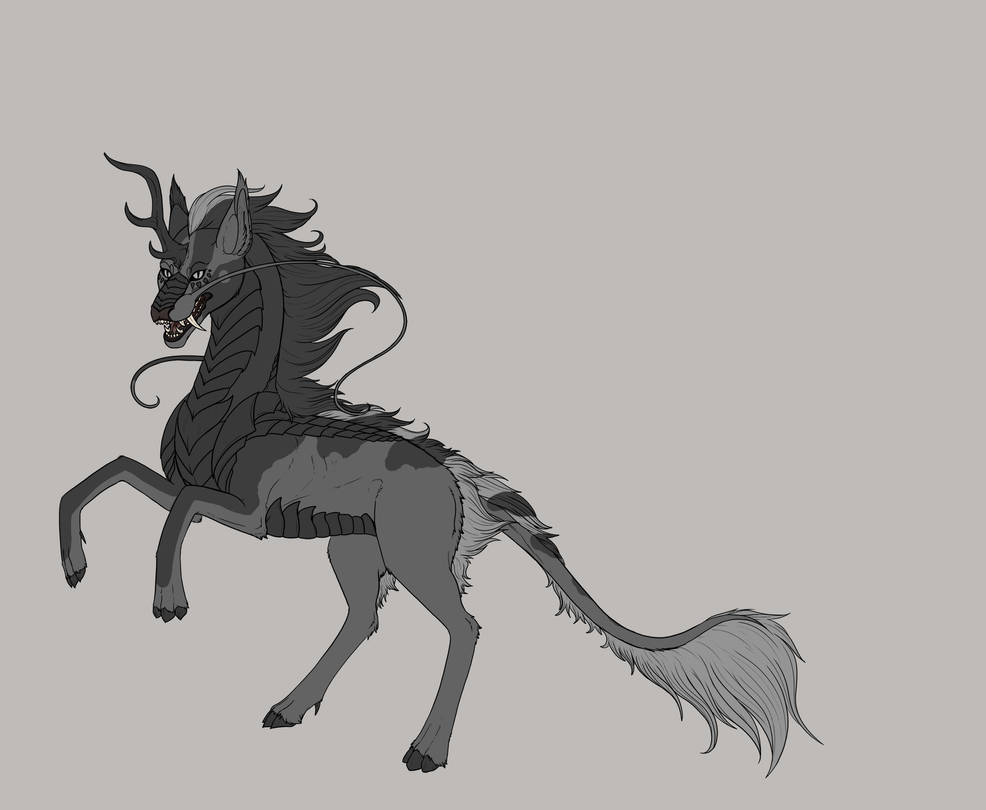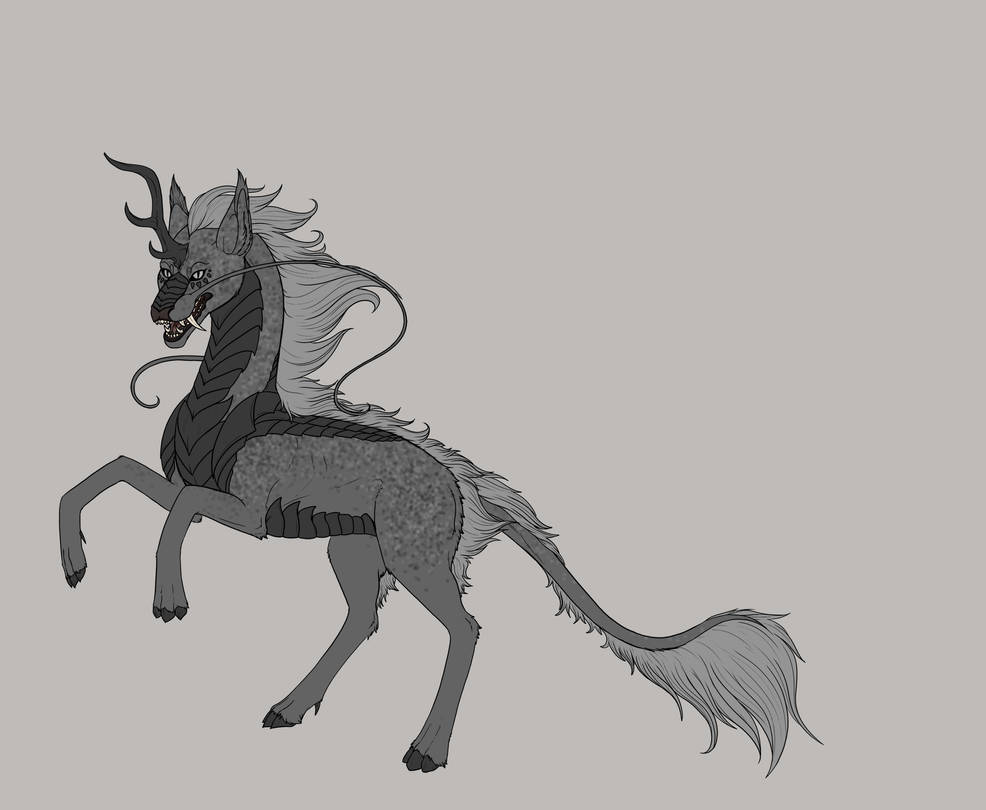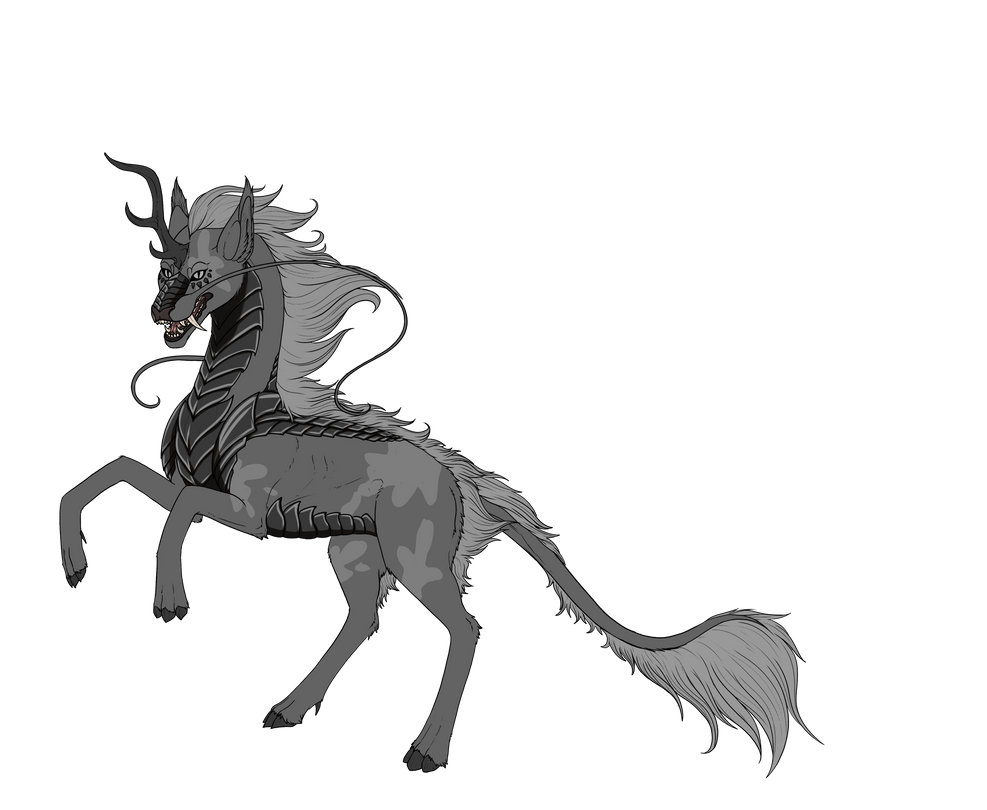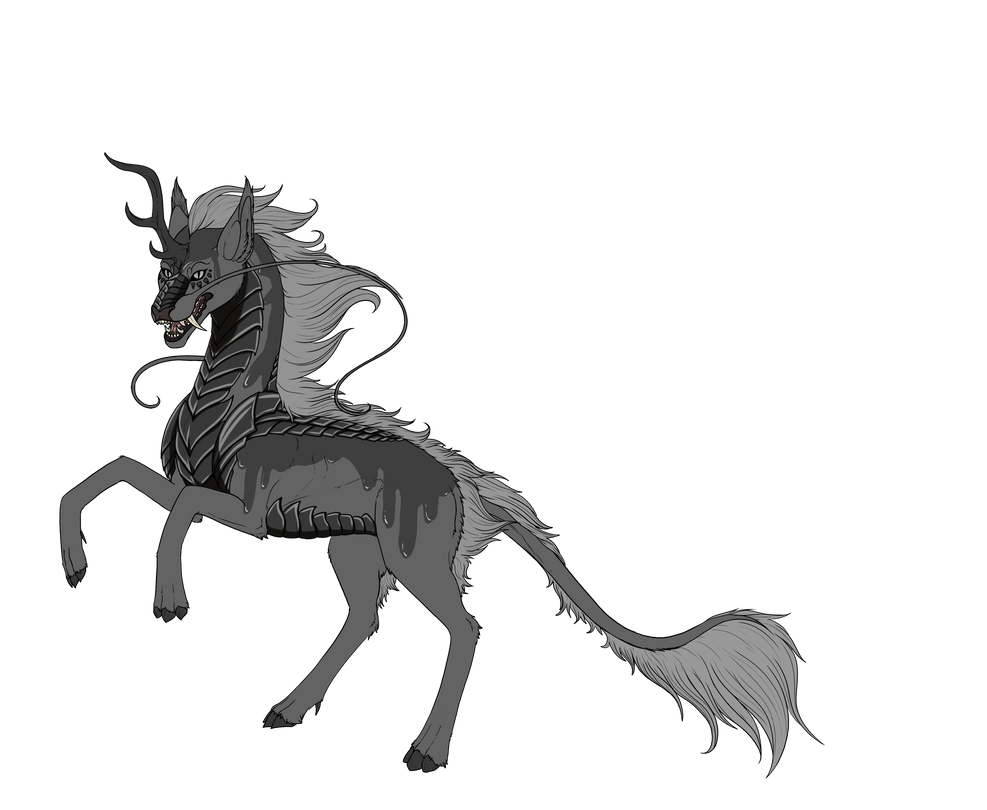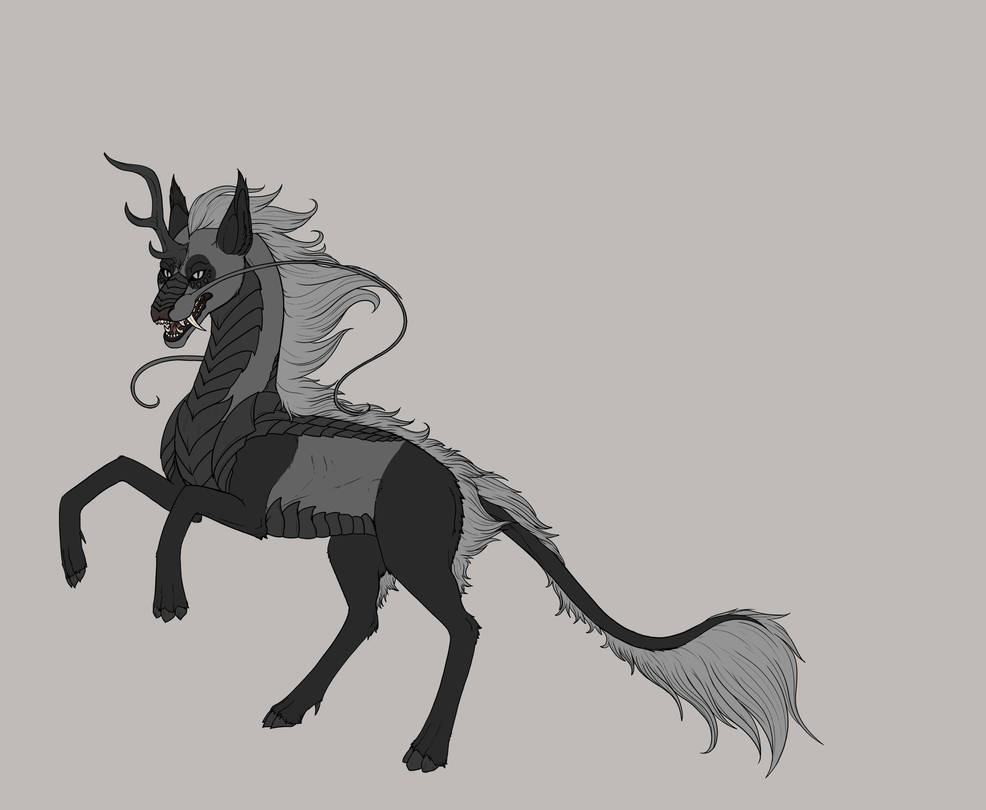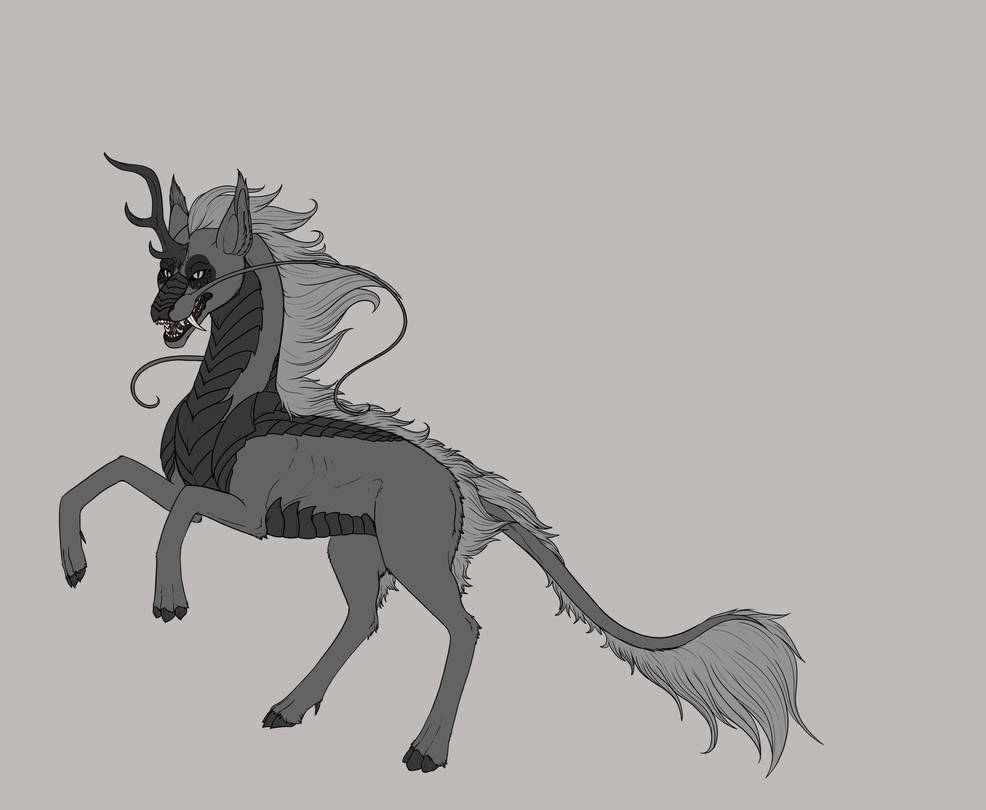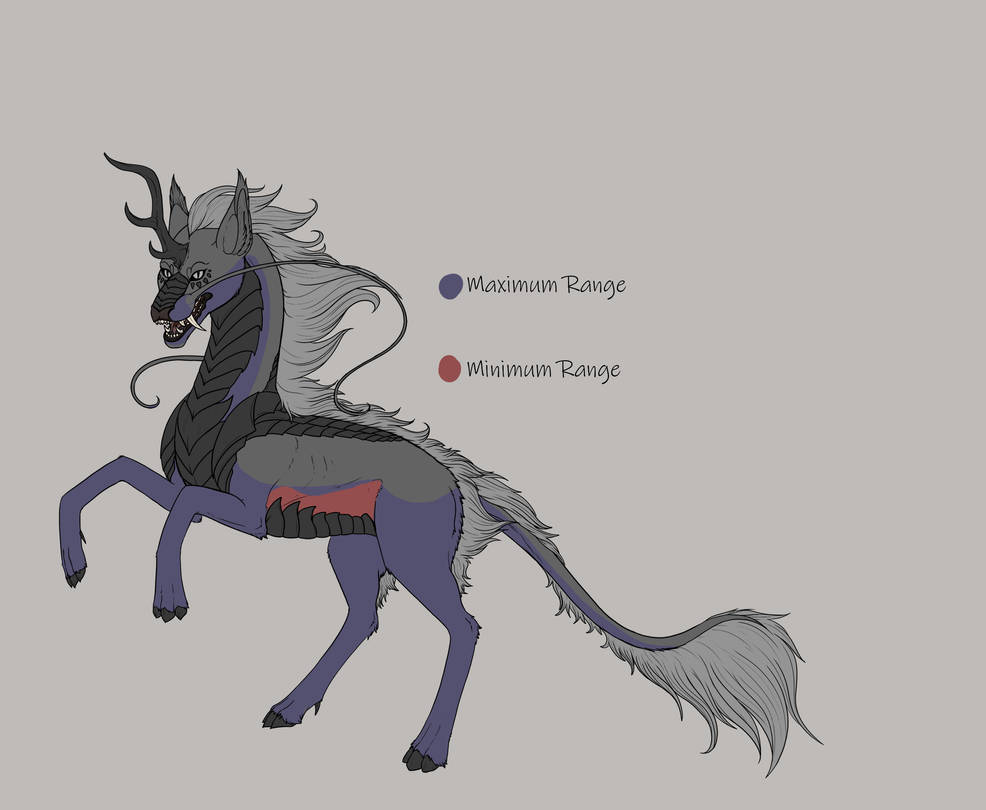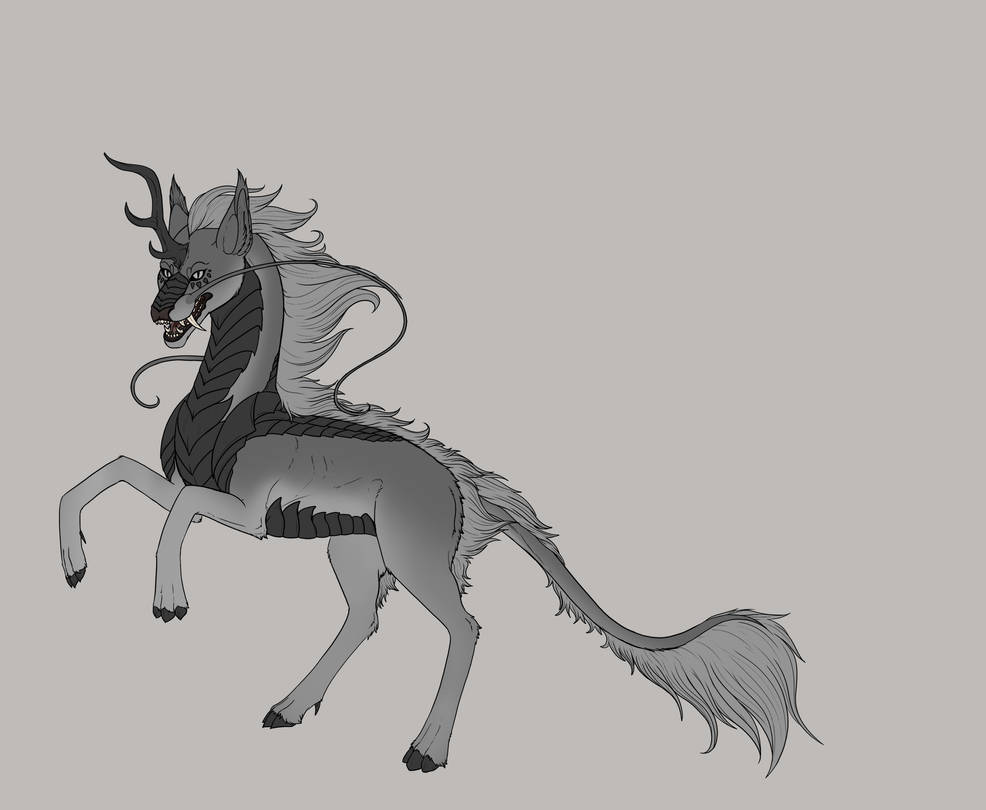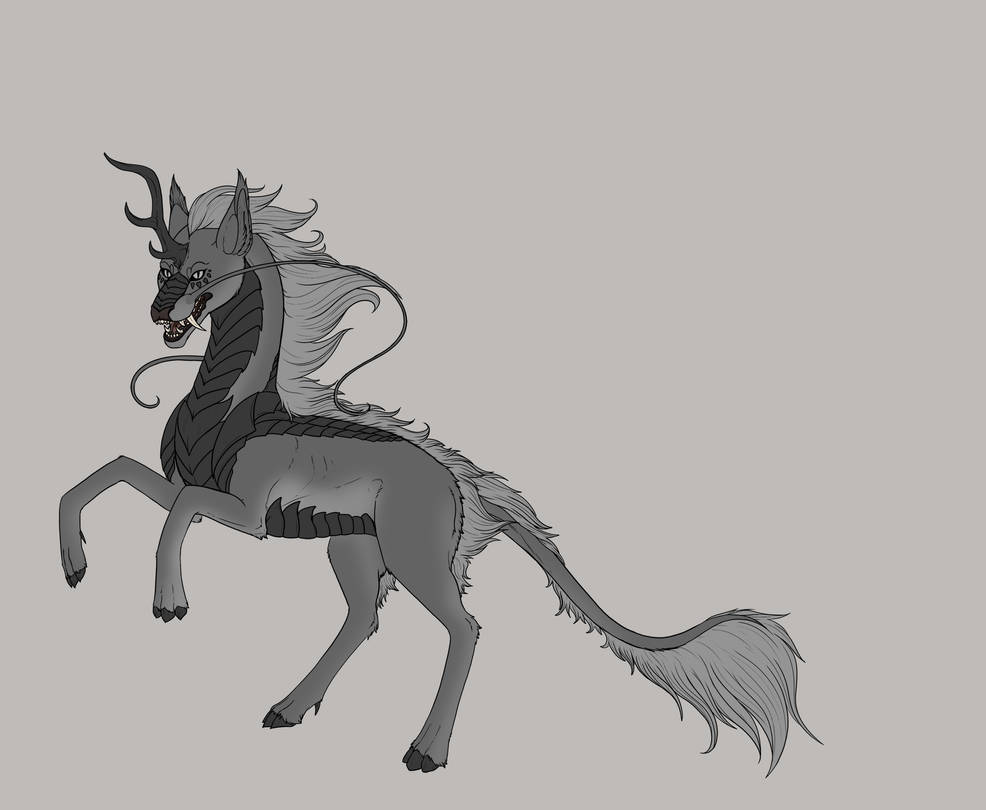Traits
Banding (Common)
Category: Markings
Species: Drakiri
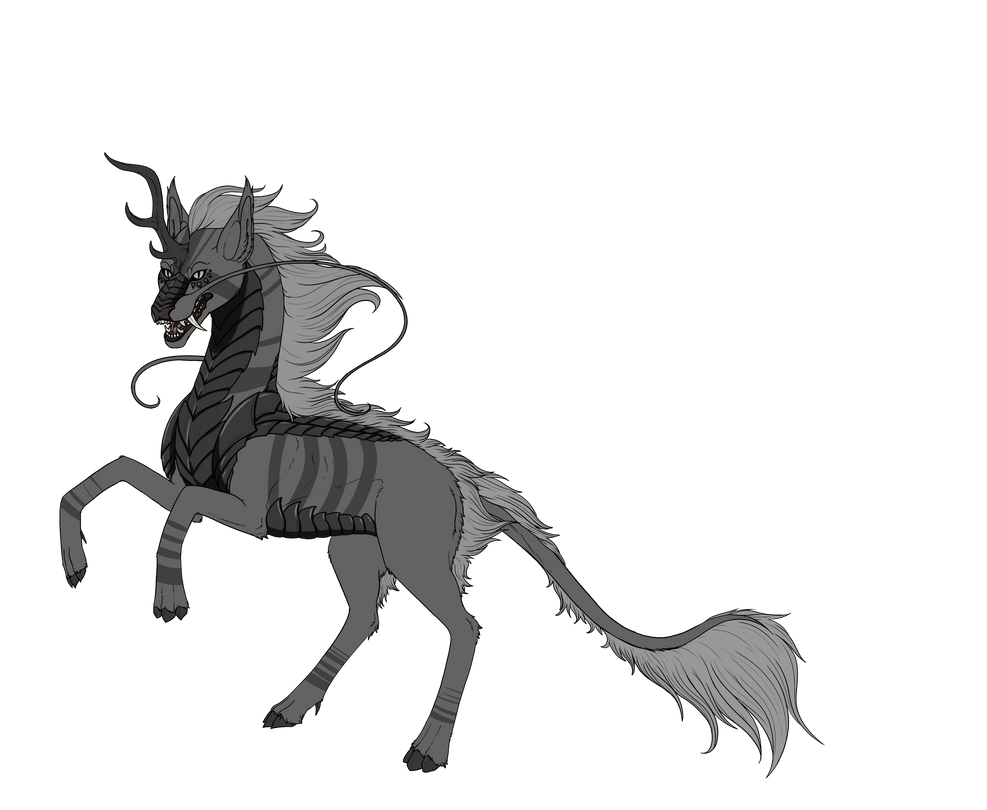
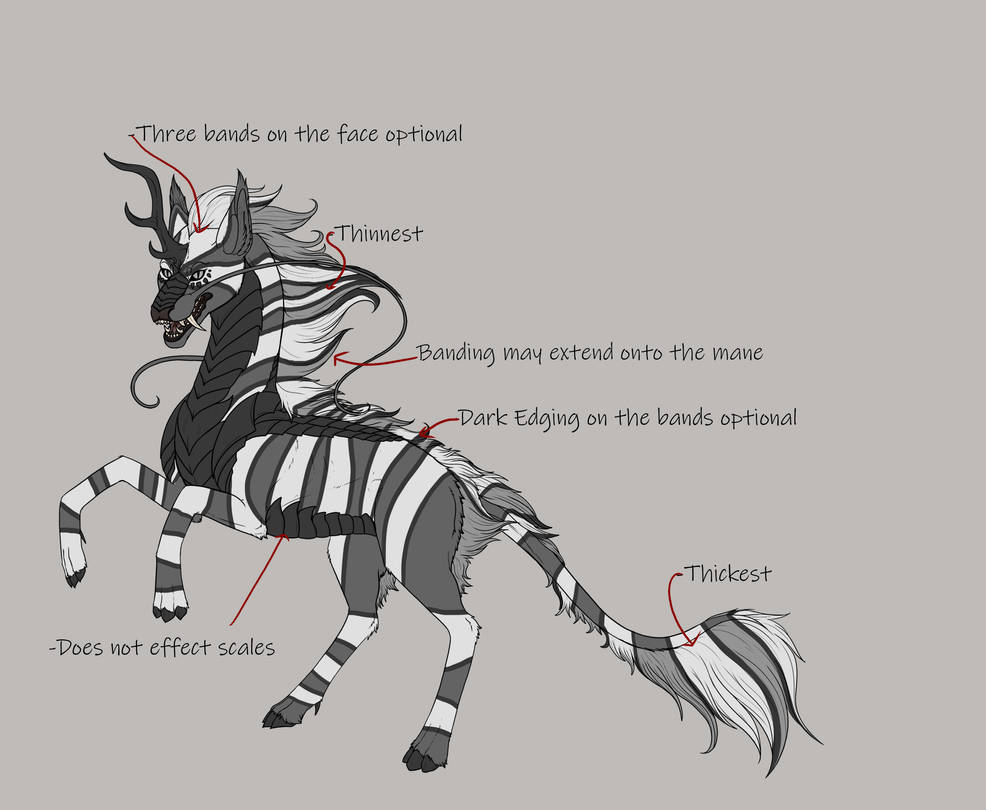
OVERVIEW
Marking Code: /cBan/nBan/BanBan
- Banding is a full body marking that creates a banded appearance across the body, similar to species such as the clownfish or regal angelfish. The guides for that sort of banding are only needed if you are using the clownfish banding and not the other variations. Banding is either dark, or light with dark rims.
- Alternately, it can resemble the banded marking of a Bongo gazelle around the midsection. When the Bongo version interacts with stripes, it can turn them light without the need for Reversal.
- It can also create small bands on the limbs, or banding like the marks found on falcons on the Drakiri's sides or wings if they have Phoenix. Banding can appear anywhere on the Drakiri's body and ranges from small thin bands on the limbs, to even a single thick band around the midsection.
RANGE AND DETAILS
- Banding has no range and can present anywhere on the Drakiri, but must be present in a noticeable way on the import. Minimally, it can appear on the legs or a couple bands around the midsection. The thickness of the band may taper, and the band shape itself may waver.
- Banding must wrap around wherever it appears on the Drakiri.
- Banding must always be vertical on the Drakiri unless on the legs, then it is horizontal
- As an alternate effect, Banding may form vertical pinstriping along the Drakiri's body
MIN RANGE
- Banding has a Min range of the midsection, face, neck, or legs. Banding does not have to affect the mane, but it can extend onto the mane where it touches.
MAX RANGE
- Full Body coverage, excluding the scales. It can effect the scales where it touches if Marked Scales is present.
SMALLER RIM BANDS
- The outer borders of banding are optional, but if they are shown they must be along the outsides of the bands, and must be significantly thinner than the main light band. They may optionally be on every band on the Drakiri, or only some or even just one of the bands, so long as they're not confused for another marking.
OTHER RANGE INFO
- Banding can affect the Mane and Tail Fur where it touches
- Banding cannot affect the scales unless marked is present in the geno
- Banding is not required to appear on the legs
- Banding is allowed to affect the following mutations
- Banding may effect Pheonix. It can create barring similar to the markings found on the wings of a hawk. If creating the barring effect on the wings, it doesn't have to be present on the body.
Blanket (Common)
Category: Markings
Species: Drakiri
BLANKET
OVERVIEW
Marking Codes: /cBln/nBln/BlnBln
- Blanket covers the top half of the Drakiri's body in a solid color that is darker than the base coat. When interacting with Sable, it may cover up Sable, or be covered up by Sable, or interact to create a semi soft or semi-blended edges, or some parts blended and some parts hard.
RANGE AND DETAILS
- Blanket is a full back coverage marking that creates a saddle like appearance at is minimum range and a cape like appearance at its maximum range.
MIN RANGE
- Just a little blanket, must at least fill in the red area above.
MAX RANGE
- Blanket can cover the entire back of the Drakiri.
OTHER RANGE INFO
- Blanket does not affect the scales of the Drakiri unless Marked Scales is present.
- Blanket does not affect the mane or tail fur of the Drakiri
COLOR, TEXTURE AND GRADIENT
- Blanket can be any natural color that does not clash with the base coat as long as it is darker, including a black Drakiri. It must be a darker black than the Drakiri itself.
- Blanket is allowed to have a solid textured edge resembling fur strokes
- Blanket cannot be faded, have a gradient, or a soft textured edge. It can get a soft edge of interacting with Pangare, or gain a gradient if effected by the marking Gradient
- Blanket's minimum must be more expansive than Saddle's range - this means that Blanket must, at its absolute minimum, either cover the entire back of the neck, the entire back, or at least part of the legs as well as the shoulders. Blanket is not allowed to restrict to only the shoulder area, to avoid confusion with a dark hard-edged Saddle.
LAYERING AND GAPS/HOLES
- Blanket is a base coat marking, so must other markings layer over it.
PHYSICAL MUTATIONS
- Blanket can affect the following mutations
- Regular base - Marginal Coverts, and quills - Wing Diagram
- Nightmare Base - Top of wing
- Optionally, for ANY base, it may make the entire wing a different color from the body - it must still be a natural-looking color unless Glimmer is present.
- Phoenix
OTHER INFORMATION
- Blanket's textured edge must be fairly simple
- Blanket may not have holes without Cutout
GOOD EXAMPLES
- Coming Soon!
Bleached (Common)
Category: Markings
Species: Drakiri
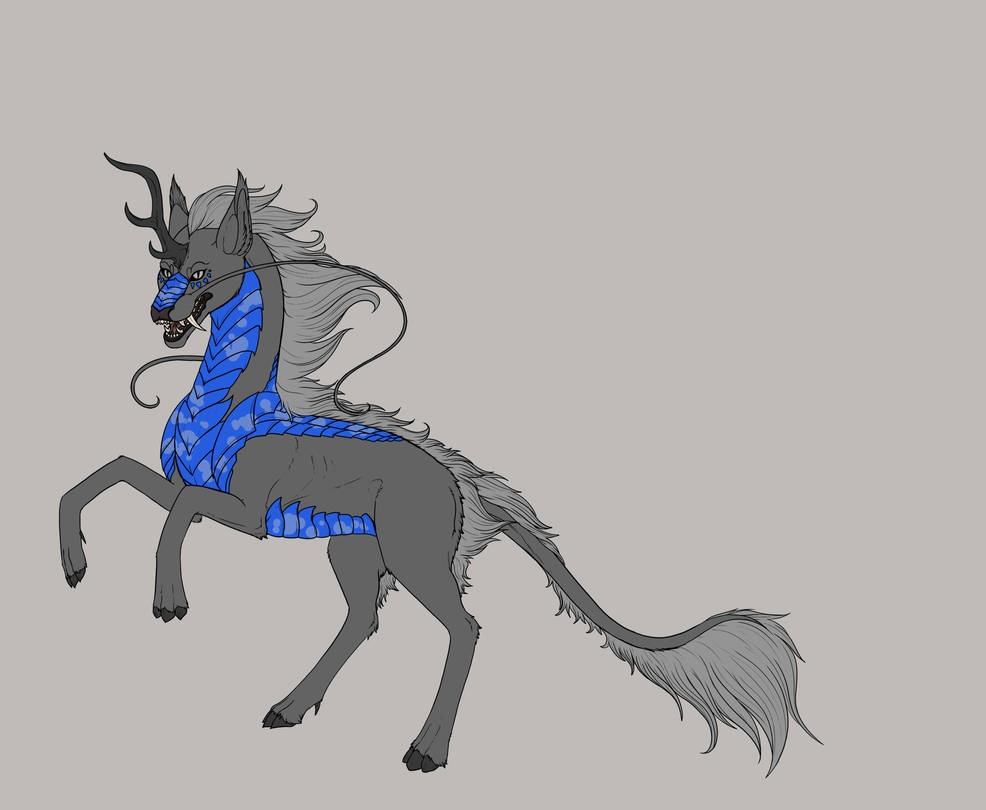
OVERVIEW
Marking Codes /cBlc/nBlc/BlcBlc
- Bleached may make the scales on the Drakiri's back, shoulders, and head a lighter shade of the main scale color - this shade can be noticeably different, so long as it is not a different hue. It does not have to cover all of the scales within its range, and may alternate scales or be soft-edged for this effect.
- Bleached may not use the Scale Spots effect if the scale lightening effect is being used.
The Scale Spots effect of Bleached is otherwise unaffected.
RANGE AND DETAILS
- Bleached is restricted to the scales only, however can be anywhere within those scales so long as some are noticeably visible on the Drakiri.
MIN RANGE
- A few lighter spots on the scales. Can be located anywhere.
- If using the underbelly version, must be present on at least the neck, chest, or belly scales.
MAX RANGE
- Light spotting covering the scales. Can be located anywhere. The scales along the belly and bottom of the neck can all be lighter than the rest, as well, giving an underbelly effect. The bleached scales must be a lighter shade of the scale color used
COLOR AND GRADIENT
- Bleached must be a lighter shade, white, or near white with a hint of the scale color.
- Bleached may be a slightly lower saturation of the scale color, as well as lighter in shade.
-
- Bleached can be affected by Glimmer, Bicolor, Tricolor and Spectrum, but can not be affected by Reversal.
OTHER RANGE INFO
- Bleached does not affect the body.
- Bleached does not affect the mane or tail.
LAYERING AND TEXTURE
- Bleached can layer over or under any other scale specific markings
- Stone or Piebald must both appear over Bleached
GOOD EXAMPLES
Coming Soon
Collar (Common)
Category: Markings
Species: Drakiri
COLLAR
OVERVIEW
Marking Codes: /cCol/nCol/ColCol
- Collar is a solid marking on the neck of the Drakiri commonly seen on several species of bird and other animals. It can also be soft edges, creating a gradient on the neck, lighter or darker than the base coat
RANGE AND DETAILS
- A collar-like marking that appears on the neck and mane of the Drakiri, which can cover the entire extent of the neck.
MAX RANGE
- This marking can cover the entire neck in one solid color, optionally affecting the mane wherever it touches.
MIN RANGE
- A single small band around the neck, and may extend into the mane. Similar to a choker necklace.
OTHER RANGE INFO
- Collar is not required to affect the mane wherever it touches unless Collar would be invisible otherwise. If the entire neck is covered by mane, then Collar must affect the mane instead of the neck. Otherwise, it only needs to affect the neck.
- Collar does not affect the scales unless Marked Scales is present in the geno
COLOR TEXTURE AND GRADIENT
- Collar can be any natural color lighter or darker than the base coat so long as it doesn't clash with the base coat color.
- The edges of Collar may be blended into the coat, solid, or given a fur texture.
- Collar may not have gaps or holes unless Cutout is present
- Collar may have a subtle gradient around the middle of the marking. The color of this gradient must be very subtle and it must blend in smoothly with no defined edges.
LAYERING
- Collar can appear above or below any other marking unless stated otherwise.
- Collar must lay below markings such as Piebald and Stone
PHYSICAL MUTATIONS
- Collar affects the following mutations:
- Cobra
GOOD EXAMPLES
Coming Soon
Crescents (Common)
Category: Markings
Species: Drakiri
CRESCENTS
OVERVIEW
Marking Codes: /cCre/nCre/CreCre
- Creates feather-like "crescents" on the Drakiri's coat.
RANGE AND DETAILS
- Crescents can appear almost anywhere on the Drakiri's body. It does not affect mane or tail fur.
MIN RANGE
- A few crescents on the face or around the shoulders, or one 'crescent moon' somewhere on the body
MAX RANGE
- Crescents on the entire body
COLOR TEXTURE AND GRADIENT
- Crescents must be darker ot lighter than the coat beneath. It can be affected by Glimmer, Firefly and Gradient.
- Crescents can touch each other, and can take many feather-like shapes, elongated, even slightly pointed as long as they don't too closely resemble Diamond. They can fade into the base coat, but cannot have fades within them.
- Crescents can have small feather-like lines within them.
LAYERING
- Crescents layer over most markings.
PHYSICAL MUTATIONS
- Crescents can trace all the feathers on Phoenix.
GOOD EXAMPLES
Coming Soon
Dapples (Common)
Category: Markings
Species: Drakiri
DAPPLES
OVERVIEW
Marking Codes: /cDpl/nDpl/DplDpl
- Light or white spots on the coat of the Drakiri. Dapples must not be bigger than the biggest shown in the above image, nor smaller than the smallest. Big and small spots may touch, but they can not resemble splatters.
RANGE AND DETAILS
- Dapples is a free range spotted-like marking, appearing anywhere on the Drakiri's coat. Often seen on spotted creatures such as the cheetah, but also seen on horse species.
MIN RANGE
- A few spots around the shoulders or hips of the Drakiri.
MAX RANGE
- Dapple-shaped spots appearing on the entire coat of the Drakiri.
ADDITIONAL RANGE INFO
- Dapples does not affect the Scales even when Marked Scales is present
- Dapples does not affect the Mane or Tail Fur
COLOR TEXTURE AND GRADIENT
- Dapples can have the following textures
- Hard Edge or subtle fur texture on the edges. Dapples can also fade into the base coat
- Dapples may resemble horse dapples, fawn dapples, and/or the hard edged light spots.
- This is up to the designer.
- Dapples must remain once consistent color throughout, unless being faded into the base coat or effected by Gradient. If effected by Gradient, both selected shades must be lighter than the base coat
LAYERING
- Dapples may be layered above or below any marking
- Dapples cannot layer above Stone or Piebald
PHYSICAL MUTATIONS
- Dapples may effect the follow mutations
- Phoenix - Entire wing
OTHER INFORMATION
- Dapples can interact with Piebald, staying close to the edges and giving the edge a splotchy appearance.
- When interacting with Piebald, they become white like the Piebald.
- Dapples is not effected by Reversal
GOOD EXAMPLES
Coming Soon
Diamond (Common)
Category: Markings
Species: Drakiri
DIAMOND
OVERVIEW
Marking Codes: /cDia/nDia/DiaDia
- Creates diamonds on the scales, or diamond shapes on the Drakiri. Also allows arrow shapes along a Drakiri’s body, as minimal as a couple around the eyes, or along the whole body
RANGE AND DETAILS
- Diamond can affect anything aside from the mane
MIN RANGE
- A small diamond somewhere on the Drakiri's body or scales, or a couple "arrows" on the face.
MAX RANGE
- Diamonds all over the body and scales.
OTHER RANGE INFO
- Diamond does not affect the mane or tail fur of the Drakiri
COLOR, TEXTURE AND GRADIENT
- Diamond can't have soft or textured edges. It must be solid, and must resemble a diamond in shape unless using the "Chevrons" or "Arrows" variation.
LAYERING AND GAPS/HOLES
- Diamond can layer above or below any marking unless otherwise specified.
- Diamond must layer beneath Stone and Piebald
PHYSICAL MUTATIONS
- Diamonds and "Arrows" can appear on the wings.
GOOD EXAMPLES
Coming Soon
Dipped (Common)
Category: Markings
Species: Drakiri
DIPPED
OVERVIEW
Marking Codes: /cDip/nDip/DipDip
- A marking that covers the rear end or the front end of the Drakiri.
RANGE AND DETAILS
- Dipped may appear on the front end or the back end of the Drakiri, but not both at the same time. Dipped my darken the markings in the areas that it effects. The darkening of the markings must be even with the edge of Dipped, and can not extend past the edge unless Gradient is used to fade them together. A suggestion is to use a layer mask for the Dipped marking if using this method, to allow it to darken what is beneath easily. The Multiply layer type is suggested.
MIN RANGE
- Frontal
- Must cover bare min the entire head
- Rear End
- My change just the tip of the tail, or the fur on the end of the tail
MAX RANGE
- Frontal
- Can extend to the midsection near where the rear leg starts, however it must still cover the head
- Rear end
- Can extend to the midsection of the body origination from the tail. However the tail must still remain fully covered.
ADDITIONAL RANGE INFO
- Dipped does effect the Mane, but is optional
- Dipped does not effect the scales unless marked scales is present
- The legs are not required to be covered, so long as its clear that the marking is still dipped.
- Dipped does effect the whiskers when effecting the front half
COLOR TEXTURE AND GRADIENT
- Dipped must be a darker shade of the base coat unless affected by Reversal
- Dipped may be blended into the coat forming a halfbody gradient. Dipped may only be a single shade throughout.
- Dipped cannot have holes, unless Cutout is present, but may have fur texture and a sway.
- Dipped can only be one shade of consistent color without any gradients unless Gradient is effecting it
LAYERING
- Dipped layers above or below any other markings unless otherwise specified for that marking. (Piebald, Stone and Appaloosa always layer over every other marking)
PHYSICAL MUTATIONS
- Dipped can currently effect the following mutations
- Frontal: Marginal, Secondary, and Primary Covert Feathers and the quills
- Rear End: Primaries, Secondaries, and Tertiary, as well as the greater coverts
- Pheonix -Wing Diagram
OTHER INFORMATION
- Tabby, Brindle, and Striped may restrict to be only present on areas effected by Dipped and fade out with it if the faded version is used
GOOD EXAMPLES
Coming Soon
Dorsal (Common)
Category: Markings
Species: Drakiri
DORSAL
OVERVIEW
Marking Codes: /cDor/nDor/DorDor
- A single thin stripe the extends down the back of the Drakiri at an even thickness. It may have small variance in thickness, as in tapering onto the neck or down the back or along the tail
RANGE AND DETAILS
- Dorsal must appear at least on the Drakiri's back. It may fade onto the neck, or fade down the tail, tapering off
MIN RANGE
- At minimum, it appears on the Drakiri itself, and doesn't touch the main
MAX RANGE
- At maximum, it may blend into the mane.
ADDITIONAL INFO
- Dorsal may affect the mane and tail fur
- Dorsal does not affect the scales unless Marked Scales is present
COLOR TEXTURE AND GRADIENT
- Dorsal can be any natural color darker than the base coat of the Drakiri. Dorsal may be dark brown on a black base coat
- Dorsal cannot be blended into the coat, the edge must be solid
- Dorsal must be only one color. No gradient is allowed unless effected by Gradient.
LAYERING
- Dorsal layers over all other markings except the following
- Piebald, Shimmer, Stone, Patches, Frosted and Fleabitten.
PHYSICAL MUTATIONS
- Dorsal can affect the following mutations
- Phoenix - It may line the edges of the wing(s) but must connect to the original marking (no floating Dorsal lines on wings)
GOOD EXAMPLES
Coming Soon
Fade (Common)
Category: Markings
Species: Drakiri
Fade
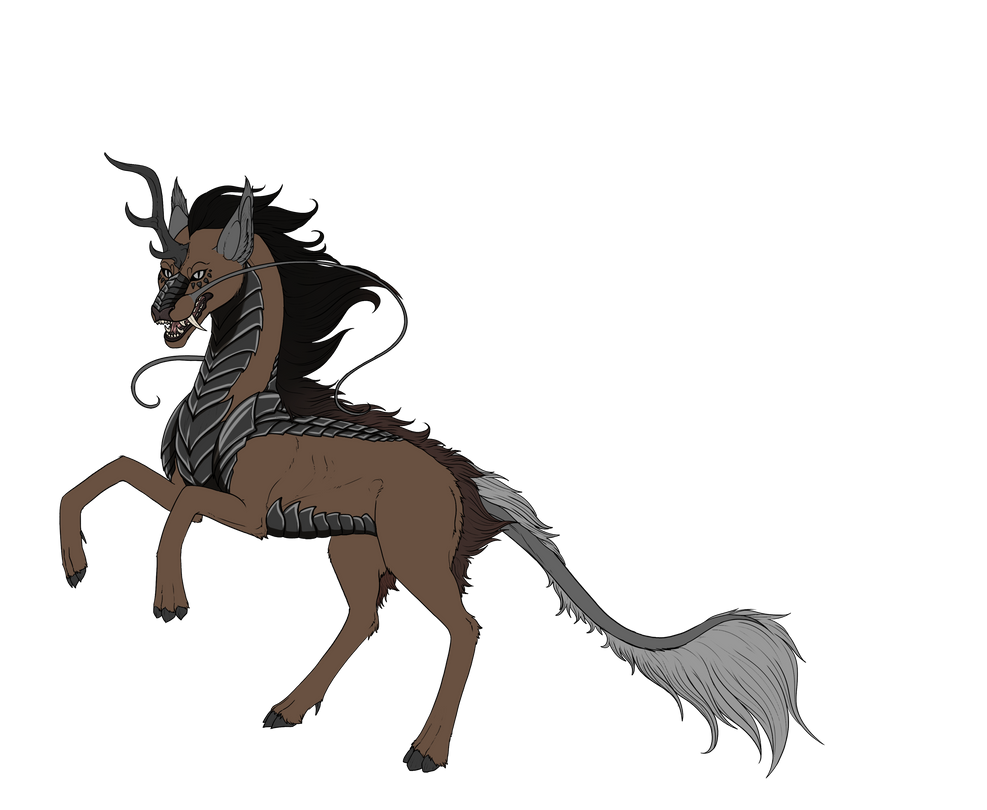
OVERVIEW
Marking Codes: cFde/nFde/FdeFde
- Fade is a mane specific marking, allowing the mane to fade between two different natural colors, front to back. For example a Drakiri with a black mane can have it fade into brown or another natural color towards the back of the Drakiri. The marking on a Drakiri
RANGE AND DETAILS
- Fade restricts to the mane fur, and can not effect anything else. It must be a natural color, and can fade the Vibrant mane color into the base coat if used with Vibrant Mane. Vibrant Mane can also use Fade, however it must fade from one shade of the chosen color to a lighter or darker shade to avoid looking too much like Bicolor unless it is used to fade Vibrant Mane into the natural mane color.
COLOR TEXTURE AND GRADIENT
- Fade must be a natural color unless effected by Vibrant Mane, and then it must be another shade of the color chosen
LAYERING
- Fade must layer beneath markings like Mane Tips and Stroke, however it can interact with Mane Tips, allowing the fade to taper onto the rest of the mane
PHYSICAL MUTATIONS
- Fade does not effect any physical mutations
GOOD EXAMPLES
Coming Soon!
Fleabitten (Common)
Category: Markings
Species: Drakiri
FLEABITTEN
OVERVIEW
Marking Codes: /cFb/nFb/FbFb
- Small dark specks or tick marks that can appear anywhere on the Drakiri's body. They can take on reddish or reddish brown tone.
RANGE AND DETAILS
- Fleabitten is a fullbody marking, though it tends to focus the most on the shoulders, hindquarters, and midsection of the Drakiri. It often appears in little clusters of dark specks
MIN RANGE
- A few little specks or ticking here and there, must at least appear on the shoulders or hindquarters.
MAX RANGE
- The entire body can be covered in the little ticks and flecks caused by Fleabitten.
OTHER RANGE INFO
- Fleabitten does not appear on the mane or scales.
- It can appear on the whiskers.
- Fleabitten may cause small dark spots on the horns and hooves.
COLOR TEXTURE AND GRADIENT
- Fleabitten must be darker than the base coat.
- Fleabitten can be either small dots, or tickmarks.
- Fleabitten must not any bigger than shown in the above image.
- Fleabitten cannot contain a gradient, and can only have one shade throughout the marking.
- Fleabitten can be effected by Glimmer, but must be a darker shade of the Glimmer color used. If used alongside glimmered Frosted, it must be a darker tone than Frosted.
LAYERING
- Fleabitten layers over other markings, aside from Stone and Piebald. Fleabitten may, however, layer over Roan.
PHYSICAL MUTATIONS
- Fleabitten can affect the following mutations:
- Phoenix
- Cobra
- Longhair
- Feathering
- Biolume - stalks only
OTHER INFORMATION
- Fleabitten cannot be affected by Reversal
- Fleabitten CAN be affected by Firefly, creating little firefly-like specks across the body. If appearing alongside Frosted effected by Firefly, it must be a darker tone than Frosted.
Known Interactions
- When involved with a three-way interaction with Frosted and Mottled, it can create an effect like Flecks on the body.
GOOD EXAMPLES
Coming Soon!
Frosted (Common)
Category: Markings
Species: Drakiri
FROSTED
OVERVIEW
Marking Codes: /cFr/nFr/FrFr
- Small light or white specks or thin, short tick marks that can appear anywhere on the Drakiri's body. If the tick marks option is used, they must flow in the direction that the fur would flow naturally. Frosted can also take the appearance of stars, but must not group too closely together to avoid resembling Shimmer. Frosted can be used with Glimmer, as long is it isn't made to resemble Shimmer.
RANGE AND DETAILS
- Frosted is a fullbody marking, though it tends to focus the most on the shoulders, hindquarters, and midsection of the Drakiri. It often appears in little clusters.
MIN RANGE
- A few little specks or ticking here and there, must at least appear on the shoulders, cheeks, midsection or hindquarters.
MAX RANGE
- The entire body can be covered in the ticking and flecks caused by Frosted.
OTHER RANGE INFO
- Frosted does not appear on the scales or in the mane.
- Frosted can appear on the whiskers.
- Frosted may cause small light flecks on the horns and hooves.
COLOR TEXTURE AND GRADIENT
- Frosted must be lighter than the base coat, or white.
- Frosted can be either small dots, or tickmarks.
- Frosted must not any bigger than shown in the above image.
- Frosted cannot have gradients and must be one color throughout unless effected by Gradient. When effected by Gradient, both tones used should be lighter than the coat beneath it.
LAYERING
- Frosted layers over other markings, aside from Stone and Piebald.
PHYSICAL MUTATIONS
- Frosted can appear anywhere on the following mutations:
- Phoenix
- Cobra
- Longhair
- Feathering
- Biolume - stalks only
OTHER INFORMATION
- Frosted cannot be affected by Reversal.
- Frosted can be affected by Firefly, creating tiny glowing flecks on the Drakiri's body.
Known Interactions
- When involved with a three-way interaction with Fleabitten and Mottled, it can create an effect like Flecks on the body.
GOOD EXAMPLES
Coming Soon
Gradient (Common)
Category: Markings
Species: Drakiri
GRADIENT
OVERVIEW
- Marking Codes: /cGra/nGra/GraGra
- A marking modifier that allows markings to have a gradient that would otherwise not have one. It can also affect gradient-style markings, such as Siamese, the gradient form of Dipped, Pangare and Sable by adding an extra color to them.
- Gradient cannot cause a significant hue change in the marking it is affecting (no blue to green). The only exception is the case of black gradating to brown or vice versa on Black base coat Drakiri (or on other similarly dark palettes), for 'must be darker than the base coat' markings.
RANGE AND DETAILS
- Gradient will always follow the rules of the marking it is applied to.
COLOR TEXTURE AND GRADIENT
- Gradient must be a natural color unless applied to a Drakiri with a color modifier, or the marking it is applied to is affected by Bicolor, Tricolor, Glimmer, Spectrum or Firefly.
- Gradient can follow other markings in where it is applied, such as darker over Blanket or Dipped, and lighter towards the body, giving some very interesting effects.
- Gradient can affect every eligible marking on the Drakiri's body.
LAYERING
- Gradient follows the layering rules of the marking it is applied to.
PHYSICAL MUTATIONS
- Gradient follows the rules of markings it is applied to. If the marking affects a physical mutation, Gradient will as well.
OTHER INFORMATION
- Gradient subtly affect Piebald, Roan and Appaloosa, but the markings must remain white or off white even on the fade.
- Gradient can gradient Skeleton to a darker tone even without Reversal
- When added to a marking such as Siamese, Sable, Pangare or the Gradient form of Dipped, it can add an extra shade and allow a noticeable gradient within the marking.
- Gradient does not effect the edges of the marking, it only adds a gradient to the marking itself
GOOD EXAMPLES
Coming Soon
Hood (Common)
Category: Markings
Species: Drakiri
HOOD
OVERVIEW
Marking Codes: /cHd/nHd/HdHd
- A dark marking on the front half of the Drakiri, creating broken spots down the length of the body extending onto the tail. Hood resembles the hood marking on a domesticated rat.
RANGE AND DETAILS
- Hood covers at least the head and part of the neck, but can extend all the way down to the tail in broken spots.
MIN RANGE
- Range seen in red must be filled
MAX RANGE
- Hood can extend all the way down the shoulder and over the legs (seen in purple)
OTHER RANGE INFO
- Splotching or breaking of color in the light blue area is required.
- A solid back will not be accepted, as it looks too much like Blanket
- Hood does not affect the scales unless Marked Scales is present
- Hood may affect the mane and tail fur anywhere where it touches
COLOR TEXTURE AND GRADIENT
- Hood can be any natural color that is darker than the base coat unless effected by Reversal or Glimmer.
- Hood can have holes around the neck and the face.
- The dark spots on Hood must always touch the back of the Drakiri.
- Hood must have solid edges. They cannot be blended or blurred.
- Hood can contain a subtle gradient, starting subtly lighter or darker on the head. This gradient must be subtle and not too noticeable. The marking, Gradient, may create a much more noticeable gradient on Hood.
LAYERING
- Hood can layer above or below any marking, though must always appear beneath Frosted, Fleabitten, Piebald, and Stone.
PHYSICAL MUTATIONS
- Hood currently can effect the following Mutations
- Cap: Marginal, Secondary, and Primary Covert Feathers and the quills
- Broken spots: Primaries, Secondaries, and Tertiary, as well as the greater coverts
- Spots can create broken barring along the feathers stated above
- Phoenix - Wing Diagram
OTHER INFORMATION
- For real life examples of the hood marking, look at hood markings on rats.
- Hood can interact with Stroke to create some very interesting mane effects.
GOOD EXAMPLES
Coming Soon
Mask (Common)
Category: Markings
Species: Drakiri
MASK
OVERVIEW
Marking Codes: /cMsk/nMsk/MskMsk
- Mask appears on the Drakiri's face. It can be a simple blaze, or a full face mask with holes and blazes in it.
RANGE AND DETAILS
- Mask is a facial marking, with many interesting effects.
MIN RANGE
- A small marking around the horn or on the muzzle of the Drakiri.
MAX RANGE
- Covers the Drakiri's entire face.
ADDITIONAL RANGE INFO
- Mask does not effect the scales
- Mask can not effect the mane or ears.
- Mask may effect the whiskers.
- Mask can take all sorts of interesting shapes, but it can not create intricate shapes. It can interact with Lacework to create intricate masquerade mask style markings on the face.
COLOR TEXTURE AND GRADIENT
- Mask can be any natural color lighter or darker than the Drakiri's coat.
- Mask can have holes in it around the muzzle.
- Mask does not have any gradients. It must be one color throughout.
- Mask may blend into the color of the whiskers.
LAYERING
- Mask can appear above or below any other marking aside from Stone and Piebald.
PHYSICAL MUTATIONS
- Mask can affect the following mutations
- Biolume - Its allowed to effect the stalks if
OTHER INFORMATION
- Mask can be affected by all current color modifiers.
- Mask can be affected by all current marking modifiers.
GOOD EXAMPLES
Coming Soon
Mottled (Common)
Category: Markings
Species: Drakiri
MOTTLED
OVERVIEW
Marking Codes: /cMot/nMot/MotMot
- Mottled is a marking that appears in light and dark spots blended into the Drakiri's base coat creating a subtle variance in color. Splatter brushes with a small amount of hue jitter using two similar shades of the base coat is an effective way to render this marking.
RANGE AND DETAILS
- Mottled is a full body marking that can cover the entire body of the Drakiri in a mottled like pattern.
MIN RANGE
- Minimally, Mottled can appear on the limbs, shoulders, hindquarters, or cheeks of the Drakiri.
MAX RANGE
- The entire coat can be mottled.
OTHER RANGE INFO
- Mottled cannot affect the mane
- Mottled does not affect the scales unless Marked Scales in present on the geno.
- When Marked Scales is present, Mottled will follow the scales color, NOT the base color.
- When Marked Scales is present, Mottled will follow the scales color, NOT the base color.
COLOR TEXTURE AND GRADIENT
- Mottled appears either light, dark, or a mix of the two.
- Mottled must be relative to the base coat. It must be a lighter and/or darker shade of the base coat.
- Mottled cannot have holes, and must be soft and subtle.
- Mottled can have breaks and is not required to be consistent across the base
LAYERING
- Mottled lays beneath ALL other markings, as it only affects the base coat. Mottling can effect Base Coat marks such as Dipped, Panda, Hood, Blanket, and Underbelly.
PHYSICAL MUTATIONS
- Mottled can affect the following mutations
- Phoenix - whole wing's base color
OTHER INFORMATION
- Mottled cannot be affected by any of the current marking modifiers
- Mottled can be affected by anything that effects the color of the base coat, even causing subtle color variance on Albinism (Optional)
Known Interactions
- When involved with a three-way interaction with Frosted and Fleabitten, it can create an effect like Flecks on the body.
GOOD EXAMPLES
Coming Soon
Paint (Common)
Category: Markings
Species: Drakiri
OVERVIEW
Marking Codes: /cPnt/nPnt/PntPnt
- Paint is a highly versatile marking. It can create splatter or patch on the chest. It can also create splashes of a natural color like paint splatters, or add a drippy edge to markings, making them look like they were painted on. The drips can have little highlights on them to make them look shiny. Paint can form splatters on the scales as well, though they must be a different shade of the scale color unless Bicolor or Tricolor is present.
RANGE AND DETAILS
- Paint can appear anywhere on the Drakiri, including the scales! It can not restrict to the mane, but may extend onto the main where it touches.
MIN RANGE
- Paint should create at least one small splatter somewhere on the Drakiri, or one little drip effect on a marking.
MAX RANGE
- Paint can create splatters all over the Drakiri!
- If Paint is interacting with Glimmer and Bicolor, Tricolor or Spectrum, it can create effects as if different colored paints were splattered all over your Drakiri! Bicolor allows two colors, Tricolor three, Spectrum any amount of colors you want.
- Paint can interact with Chroma, by making the entire Drakiri's base coat look like a chaotic splatter of paint beneath the other markings! (Optional)
COLOR TEXTURE AND GRADIENT
- Paint can not have a gradient unless the Gradient marking is present
- Paint must be natural colors unless Glimmer is present.
- Bicolor, Tricolor and Spectum can create splatters of different colors on the Drakiri, or allow more than one natural color.
LAYERING
- Paint can layer over or under any marking aside from Piebald and overlay markings such as Stone, Smoke and Satin.
PHYSICAL MUTATIONS
- Paint can create splatters on the wings of Phoenix, or a patch of different color on the wings (Like just the flight feathers or similar)
GOOD EXAMPLES
Coming Soon
Panda (Common)
Category: Markings
Species: Drakiri
PANDA
OVERVIEW
Marking Codes: /cPan/nPan/PanPan
- A dark marking resembling the markings on a panda.
RANGE AND DETAILS
- Panda can cover the limbs, tail, ears, and patches around the eyes.
MIN RANGE
- Panda must at least show as patches on the eye.
MAX RANGE
- The marking can cover the entire front and rear limbs, along with the tail and ears of the Drakiri.
OTHER RANGE INFO
- Panda can cover just the front legs if desired, but must cover the entire leg up to the withers. It can also only cover the rear leg, and does not have to cover the tail.
- Panda does not affect the scales
- Panda can affect the mane or tail fur
COLOR TEXTURE AND GRADIENT
- Panda can be any natural color darker than the base coat.
- Panda can not have holes
- Panda must have hard edges, or slightly fur textured.
- Panda must be one shade throughout, it can not contain a gradient.
LAYERING
- Panda can layer over or under any marking. It must appear beneath Frosted, Fleabitten, Piebald or Stone.
PHYSICAL MUTATIONS
- Panda can color the wings of Phoenix as long as it's also covering at least the forelimbs.
GOOD EXAMPLES
Coming Soon
Pangare (Common)
Category: Markings
Species: Drakiri
OVERVIEW
Marking Codes: /cPgr/nPgr/PgrPgr
A soft light colored gradient marking appearing on the underside of the Drakiri.
RANGE AND DETAILS
- Pangare can only effect the underside of the Drakiri
MIN RANGE
- Minimally, it must appear on the belly area.
MAX RANGE
- It can cover the entire underside of the Drakiri.
OTHER RANGE INFO
- Pangare does not have to cover the entire leg. It can cover just the back of the leg. If covering the entire leg, Pangare must extend onto the belly as well to avoid looking like reversed Siamese.
- Pangare can not effect the mane or tail fur
- Pangare does not effect the scales, even with Marked Scales present
- Pangare can cover up Underbelly if both are present on a geno, or, alternatively, be covered up by Underbelly. Only one has to show on your import of the geno has both.
COLOR TEXTURE AND GRADIENT
- Pangare can be any natural color that is lighter than the base coat.
- Pangare is a soft marking. The edges can not be distinct, they must blend into the color beneath unless interacting with Underbelly. Then it can create a semi-hard edge. Pangare can optionally cover up Underbelly, or be covered up by Underbelly if both are present on a geno.
- Pangare may not have holes.
- Pangare must be one shade throughout unless effected by Gradient
LAYERING
- Pangare can layer above or below any other marking. It must, however, appear beneath Stone and Piebald.
PHYSICAL MUTATIONS
- Pangare can effect the following mutations
- Phoenix - the flight feathers or membranes only, and only the underside
GOOD EXAMPLES
Coming Soon!
550 results found.

